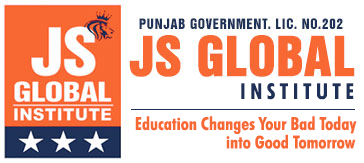The purpose of education is to help you reach your potential, improve your skill set and expand your career opportunities. To make sure this occurs, it is important to set educational goals. Do you want a job? A first job or a better job? Your dream job? Successfully applying for and landing the job you are seeking depends not only on your education and qualifications, but on the way how you present yourself to a prospective employer in an effective manner. The primary step to make a good impression is to create a strong resume and cover letter, which will showcase your work experience, education, and skills, and introduce you to a potential employer,hopefully earning you an interview.
At JS Global Institute , we include information and material regarding resume writing in our programs, to ensure that graduates are well-equipped to make the most of their education to achieve their career goals.
Components good resume includes:-
- Clean, uncluttered layout
- Clear contact information
- A concise, engaging introduction that is either a Resume Summary, or an Resume Objective statement
- Employment History Section, with:
- Jobs history, listed in reverse-chronological order (current or most recent first)
- 4 – 6 bullet points for each job, listing your responsibilities/accomplishments/skills
- Education Section, also in reverse-chronological order
- Skills Section, listing important and relevant skills, particularly those that relate to the specific job for which you are applying
- Hobbies Section. This is optional, but if you have room for it, it can offer a better overall picture of who you are.
Once you have your created your master resume, you should then customize it for each job application, to add keywords related to the requirements in the job posting, and to emphasize the elements of your resume which are more relevant to the position.
Cover Letter
When you’re applying for a job, a cover letter lets you show a personal side and demonstrate why hiring you is a smart decision.. Your cover letter should always be tailored to the specific job for which you are applying, preferably addressed to the person who is doing the recruiting, and certainly highlighting important points which are directly related to the available job.
This is where you have the opportunity to expand on the most relevant points from your resume, where they had to be kept brief, which are directly related to the position advertised, and which show that you are qualified and suited to the job. Most recruiters will not even consider resumes which do not have cover letters, so ensure that you do not skip this vital element.


